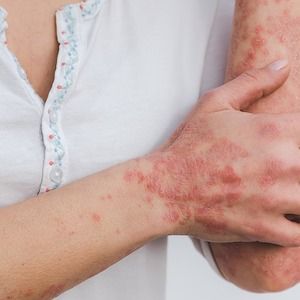Risankizumab Shown to be Superior to Apremilast in Treating Adults with Moderate Psoriasis
This new phase 4 data provides some valuable insights for healthcare professionals and those seeking to compare therapy options for psoriasis.

AbbVie released the results of the phase 4 IMMpulse study demonstrating that risankizumab outperformed apremilast as a systemic therapy through several measures, achieving all of its primary and secondary endpoints with no new safety signals in adult patients with moderate plaque psoriasis.1
The IMMpulse trial indicated that significantly more individuals treated with risankizumab were shown to have achieved the co-primary endpoints of Psoriasis Area and Severity Index (PASI) 90 and Static Physician's Global Assessment (sPGA) 0/1 compared to apremilast-treated patients.2
The results showed that 55.9% of those given risankizumab were able to achieve PASI 90 and 75.4% were able to achieve sPGA 0/1, whereas only 5.1% and 18.4% could manage the same endpoints with apremilast, respectively.
Additionally, the study’s investigators noted that the amount of participants achieving the ranked secondary endpoint of PASI 75 at 16 weeks was shown to be much higher in the risankizumab arm (84.7%) compared to the apremilast arm (18.8%).
"As a physician, it's crucial to validate different options that can achieve high treatment targets, and this study provides practice-relevant data," lead study investigator, Linda Stein Gold, MD, said in a statement. "These data reinforce the efficacy of SKYRIZI for use in systemic-eligible moderate psoriasis patients with an observed safety profile similar to prior studies."
The study was a global, multicenter, open-label, randomized, efficacy assessor-blinded, active comparator design, and it evaluated the effects of risankizumab (administered as a 150 mg subcutaneous injection at weeks 0, 4, 16, 28, and 40) compared to apremilast (administered as 30 mg twice daily orally following titration) in those with moderate psoriasis eligible for systemic therapy.
Inclusion in the study required participants to have exhibited stable moderate psoriasis at both screening and at baseline, as defined by BSA (Body Surface Area) between 10% - 15%, PASI of 12 at least, and sPGA score of 3 (moderate).
For patients who could not achieve PASI 75 with apremilast at 16 weeks, re-randomization to risankizumab ended up leading to a substantially higher proportion of participants achieving PASI 90 at 52 weeks compared to participants who continued with apremilast (72.3% compared to 2.6%).
Throughout the study’s 52-week treatment period, 73.7% of risankizumab patients were found to have achieved the pre-specified endpoints of PASI 90, and 63.6% reached PASI 100, while only 4.5% and 2.7% of those in the apremilast arm achieved PASI 90 and PASI 100 at 52 weeks, respectively.
The study’s investigators also noted that the Treatment Satisfaction Questionnaire for Medication version 9 (TSQM-9) showed that risankizumab-treated individuals reported higher treatment satisfaction at 16 weeks. There were greater scores in all 3 domains of satisfaction with effectiveness, convenience, and global satisfaction compared to apremilast-treated individuals.
Regarding safety, risankizumab was found to be well-tolerated, with no new safety signals identified by the research team. The most frequent adverse events reported in risankizumab-treated individuals were nasopharyngitis, COVID-19, and upper respiratory tract infections.
For apremilast-treated study participants, nausea, diarrhea, and headaches were the most frequent adverse events reported. Serious adverse events were noted in a small proportion of individuals in both treatment groups.
Psoriasis is a chronic, immune-mediated, inflammatory skin condition known to affect approximately 2 - 3% of people across the world. The skin disease leads to the rapid growth of thickened and scaling skin, with physical symptoms as well as effects on patients’ emotional, psychological, and social well-being of those affected.
References
- AbbVie. Skyrizi™ (risankizumab) Achieved Superiority Versus Apremilast for Co-Primary Endpoints Among Adult Patients with Moderate to Severe Plaque Psoriasis in Phase 4 Head-to-Head Study [press release]. Published July 26, 2023. Accessed July 26, 2023. Available from: https://news.abbvie.com/news/press-releases/skyrizi-risankizumab-achieved-superiority-versus-apremilast-for-co-primary-endpoints-among-adult-patients-with-moderate-plaque-psoriasis-in-phase-4-head-to-head-study.htm.
- Linda F Stein Gold and others, Comparison of risankizumab and apremilast for the treatment of adult patients with moderate plaque psoriasis eligible for systemic therapy: results from a randomised, open-label, assessor-blinded phase IV (IMMpulse) study, British Journal of Dermatology, 2023;, ljad252, https://doi.org/10.1093/bjd/ljad252.